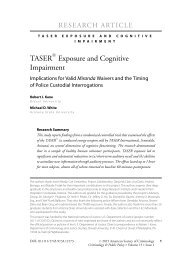1qaSADJ
1qaSADJ
1qaSADJ
Create successful ePaper yourself
Turn your PDF publications into a flip-book with our unique Google optimized e-Paper software.
Special Focus:<br />
Writing Persuasively<br />
of Our House, July 18 th , 1666” (http://eir.library.utoronto.ca/rpo/display/poem218.html)<br />
readily lends itself to such analysis. Like Marvell’s “To His Coy Mistress,” this poem’s<br />
three-part argument becomes apparent when one explores the tone in each threestanza<br />
segment. Bradstreet’s speaker moves through three stages: (1) shock tempered<br />
by resignation, (2) genuine regret and longing, and (3) sincere acceptance of the notion<br />
that in heaven she will be amply rewarded. The speaker first resorts to logic, then to<br />
emotion, and finally to faith—a first-generation Puritan pilgrim’s “progress”—concluding<br />
(quite unlike Marvell’s speaker!) that although all of her material possessions have been<br />
destroyed, she can look forward to her heavenly reward: “The world no longer let me love;/<br />
My hope and Treasure lies above.” Examining structure and tone is the stuff of rhetorical<br />
analysis, of analysis of argument. Simply to use the word “argument” in connection with a<br />
poem or other work of fiction is the first key step in teaching literature rhetorically.<br />
Another Bradstreet poem was featured in a free-response question on the AP English<br />
Literature Exam in 1996: “The Author to Her Book” (http://eir.library.utoronto.ca/<br />
rpo/display/poem208.html). This poem relies on extended metaphor—the focus of<br />
the question on the AP English Literature Exam—but it also relies on argument. She<br />
essentially offers five reasons for the public to disregard her book. Asking students to<br />
identify those reasons, perhaps even to rank them from least to most convincing, would<br />
constitute a rhetorical reading of this poem. So too would be a discussion of the ethos of<br />
the speaker and, a corollary to that, the tone of the poem.<br />
One of my favorite Bradstreet poems is “A Letter to Her Husband Absent upon Public<br />
Employment” (http://poetry.poetryx.com/poems/8478). Here, Bradstreet’s erudition<br />
and passion truly manifest themselves. The poem’s title conveys its subject: Bradstreet’s<br />
speaker is lonesome for her husband, who is away on a business trip. She is eager for his<br />
return, so she voices all the reasons that he needs to hustle home. In a side of Puritanism<br />
that students rarely experience, Bradstreet’s speaker is unabashedly hot for her guy:<br />
I, like the Earth this season, mourn in black,<br />
My Sun is gone so far in’s zodiac,<br />
Whom whilst I ‘joyed, nor storms, nor frost I felt,<br />
His warmth such fridged colds did cause to melt.<br />
Heat and chill, Cancer and Capricorn, summer and winter constitute the poem’s central<br />
conceit—but from a rhetorical standpoint, the question is the nature of the arguments<br />
that the speaker offers about her relationship with her husband as well as how convincing<br />
they are. On what appeals does the speaker rely? Does she use ethos, logos, and pathos,<br />
or does she privilege one of them? Students can track the types of arguments and judge<br />
AP® English Language and Composition: 2006–2007 Workshop Materials 35



